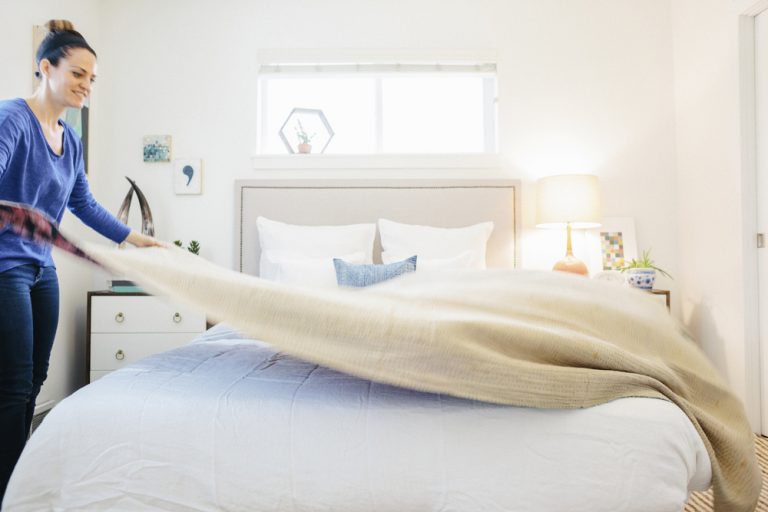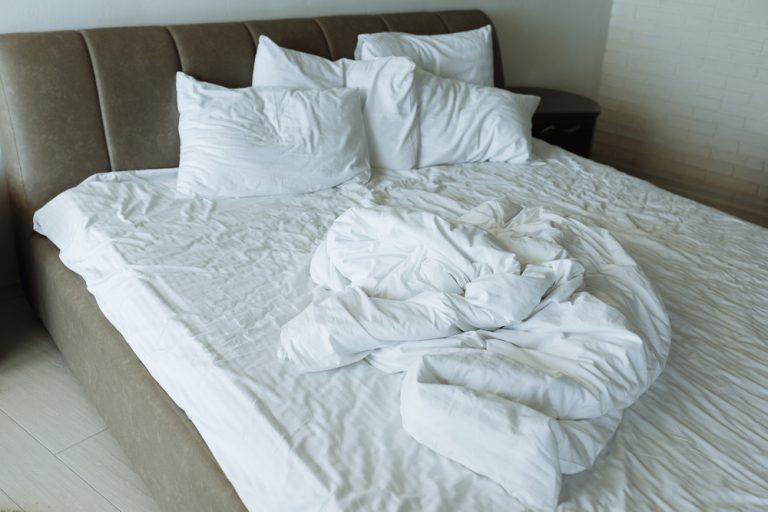When was the last time you spent an entire day laying in your bed binge-watching Netflix? Was it this past weekend?
While you might not have spent the entire day watching movies and catching up on old reruns of your favorite show, it is likely that you spent some significant time in your bed over the weekend…and last week…and the week before that.
The average person spends over one-third of their entire lives in bed. Spending a third of our lives in bed means that our beds, and our sheets, get pretty grimy on a regular basis.
If you don’t think that’s true, think about how stinky and smelly your socks get after just one day of wear. Now imagine that stink and smell in your bed, rubbing all over your sheets.
And that’s just the stink and filth coming off of your feet! You have an entire body attached to those feet that are also contributing to the stink and filth of your bedsheets.
Now imagine that build up of smelly filth day in and day out… you are probably running to change your bedsheets right now, aren’t you? How do you know if you are washing your bed sheets enough?
Develop a Routine

As part of your clean-up routine, start incorporating cleaning your bedsheets on a weekly basis, according to New York University microbiologist Philip Tierno.
Tierno says that obviously, if your bed sheets become dirty throughout the week, you’ll want to change them more frequently, but most people should be changing their sheets at least once a week.
Children’s beds can get away with waiting a little longer, but in an effort to keep the germs and bacteria at a minimum, changing children’s sheets once a week is also a good idea. If you or a family member sweat a lot, you’ll want to change your bedsheets more than once a week.
The average person sweats out 26 liters of sweat per year, and it seeps into your sheets and bed. Imagine how heavy your mattress will be after a few years of soaking up liters upon liters of sweat. Gross. Just gross.
That thought alone will make you want to switch to an inflatable air mattress and change the sheets every day. But if you aren’t neurotic or obsessed with having super-clean bedsheets every day, then changing the bed sheets once a week will get the job done.
What Happens if You Don’t Change Your Bed Sheets on a Regular Basis?

According to scientists, there is a lot of life in your beds that we don’t see or feel…until it makes us sick. Millions of spores and bacteria are living in your homes and beds, and if they find themselves in the right amount of moisture and perfect temperature, they can become harmful.
What’s more, dirty and smelly mattresses are the perfect breeding ground for mold growth and bed bugs. Many experts recommend replacing a bed mattress every 5-8 years, but if that seems too long for you, consider replacing your mattress even more frequently.
To help reduce the amount of sweat and grime that collects in your mattress, use a mattress pad and a set of high-quality sheets.
Some sheets “wick away moisture” but where do you think that moisture is going? Right into your mattress. So using a mattress pad will help reduce the need to replace your mattress more frequently, and it will help keep a lot of the sweat and dirt on the surface of your bed, instead of in it.
In a nutshell, if you aren’t changing your sheets on a regular basis, you are setting yourself up for the possibility of getting sick. Mold and bed bugs can cause a lot of health issues including respiratory conditions.
Not to mention the bites that bed bugs leave behind: if you wake up with pin-hole size red dots on your body, it’s possible that you have bed bugs They are hard to see, but you’ll know they are present if your bed has discoloration on the sides and bottom of the bed.
This is why they go unnoticed for so long because they don’t often appear on the top of the mattress. You need to go looking for them. And they are ridiculously hard to destroy. So save yourself the heartache of trying to deal with bed bugs or harmful mold, and use a mattress pad, and change your sheets on a regular basis.












